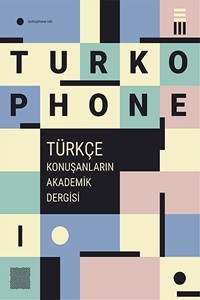The Intercultural Reflection in Lecturing German as a Foreign Language: Analysis of Textbooks
Language, Culture, intercultural communication, teaching, textbooks
The Intercultural Reflection in Lecturing German as a Foreign Language: Analysis of Textbooks
Language, Culture, intercultural communication, teaching, textbooks,
___
- Altmayer, C. (2006a). Kulturelle Deutungsmuster’ als Lerngegenstand. Zur kulturwissenschaftlichen Transformation der ‚Landeskunde’. Fremdsprachen Lehren und Lernen 35. München.
- Bettermann, R. (1998). Erkennen, Erleben und Erfahren in Landeskunde. Në: Dagmar, Blei & Ulrich Zeuner (Hrsg.) (1998), Theorie und Praxis interkultureller Landeskunde in Deutsch als Fremdsprache. Bochum.
- Bredella, L. & Delanoy, W. (Hrsg.) (1999). Interkultureller Fremdsprachenunterricht: Das Verhältnis von Fremdem und Eigenem. Tübingen.
- Bredella, L. (1999). Zielsetzungen interkulturellen Fremdsprachenunterrichts. Në: Bredella, Lothar - Delanoy, Werner. (Hrsg.) (1999). Interkultureller Fremdsprachenunterricht: Das Verhältnis von Fremdem und Eigenem. Tübingen.
- Edmondson, W. & House, J. (1998). Interkulturelles Lernen: ein überflüssiger Begriff. Zeitschrift für Fremdsprachenforschung 9,2. In: http://www.dgff.de/de/zff/zff-ausgaben/band-9-heft-2- 1998.html?cHash=ed45d8d9f729133d35b8265fdc2e332e.
- Erdmenger, M. (1996). Landeskunde im Fremdsprachenunterricht. München.
- Europarat. (2001). Gemeinsamer europäischer Referenzrahmen für Sprachen. lernen, lehren, beurteilen. Berlin. Hilpert, S., Kerner, M., Niebisch, D., Specht, F., Weers, D., Reimann, D. & Tomaszewski, A. (2007). Schritte 4 International. Kursbuch & Arbeitsbuch. Ismaning.
- Hilpert, S., Niebisch, D., Penning-Hiemstra, S. & Tomaszewski, A. (2006). Schritte 3 International. Kursbuch & Arbeitsbuch. Ismaning.
- Hiltraud, C. H. (2006). Konzepte einer Kulturlehre und Kulturwissenschaft im Fach Interkulturelle Germanistik/Deutsch als Fremdsprache. In: Jahrbuch Deutsch als Fremdsprache 32. Verlag: Iudicium.
- Hu, A. (1999). Interkulturelles Lernen. Eine Auseinandersetzung mit der Kritik an einem umstrittenen Konzept. Zeitschrift für Fremdsprachenforschung 10. 2.
- Kaikkonen, P. (2005). Fremdsprachenunterricht zwischen Moderne und Postmoderne. Info DaF 32, 4. In: http://www.daf.de/downloads/InfoDaF_2005_Heft_4.pdf.
- Krumm, H. J. (1998). Landeskunde Deutschland, D-A-CH oder Europa? Über den Umgang mit Verschiedenheit im DaF-Unterricht. Nw: Info DaF 25. 5. In: http://www.daf.de/downloads/InfoDaF_1998_Heft_5.pdf#page=3&view=Fit
- Lüsebrink, H. J. (2005). Interkulturelle Kommunikation. Interaktion, Fremdwahrnehmung, Kulturtransfer. Stuttgart, Weimar.
- Miard-Delacroix, H. & Vailllant, J. (2006). Civilisation allemande. Në. Jahrbuch Deutsch als Fremdsprache 32. In: http://www.iudicium.de/katalog/168-9.htm.
- Niebisch, D., Penning-Hiemstra, S., Spest, F., Bowermann, M. & Reimann, M. (2006). Schritte 1 International. Kursbuch & Arbeitsbuch. Ismaning.
- Niebisch, D., Penning-Hiemstra, S., Spest , F., Bowermann, M. & Reimann, M. (2006). Schritte 2 International. Kursbuch & Arbeitsbuch. Ismaning.
- Roche, J. & Roussy-Parent, M. (2006): Zur Rolle der kontrastiven Semantik in interkultureller Kommunikation. Fremdsprachen Lehren und Lernen 35, Tübingen.
- Schilling, K. (2004). Die Herausforderung der Landeskunde – Lehrererfahrungen und Forschungsperspektiven. Në. Jahrbuch Deutsch als Fremdsprache 30. München.
- Schoch, M. (2011). Duden. Deutsches Universalwörterbuch. Mannheim. Zürich.
- Tenning, R. (1999). Theorie und Praxis bei der Vermittlung von „interkulturellen Kompetenz“. In: Bredella, Lothar - Delanoy, Werner (Hrsg.) (1999). Interkultureller Fremdsprachenunterricht: Das Verhältnis von Fremdem und Eigenem. Tübingen.
- Vaillant, J. & Wierlacher, A. (2006). Landesstudien. Në. Jahrbuch Deutsch als Fremdsprache 32. München.
- Weimann, G. & Hosch, W. (1991). Geschichte im landeskundlichen Deutschunterricht. Zielsprache Deutsch 22. Münster.
- Weimann, G. & Hosch, W. (1993). Kulturverstehen im Deutschunterricht. Ein Projekt zur Lehrerfortbildung. Info DaF 20. Verlag: Iudicium.
- Wierlacher, A. & Bogner, A. (Hrsg.) (2003). Handbuch interkulturelle Germanistik. Stuttgart, Weimar.
- Wierlacher, A. (Hrsg.) (1985). Das Fremde und das Eigene. Prolegomena zu einer interkulturellen Germanistik. München.
- ISSN: 2148-6808
- Başlangıç: 2014
- Yayıncı: Bekir İNCE
Yabancı Dil Olarak Türkçe Öğretiminde “Metin Türü Odaklı Açıklayıcı Metin Yazma Modeli”
Murat DEMİRKAN, Gülay HEPPINAR
Advertising Language Seen on The Morphological Plane
Glimpses on Proverbs About Women in English And Albanian Language
The Intercultural Reflection in Lecturing German as a Foreign Language: Analysis of Textbooks
Challenges of Teaching Translation of Culture-Bound Terms
Yabancı Öğrencilerin Türkçe Yazma Becerisine Karşı Öz Yeterlik Algıları
Arnavutçadaki Turkizmalar İçin Çağdaş Bir Bakış Açısı
Türkçenin Yabancı Dil Olarak Öğretiminde “Muhtasar Sarf Ve Lügat-ı Türki”
